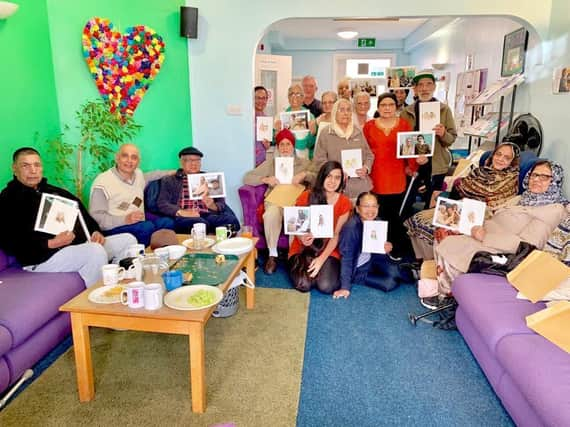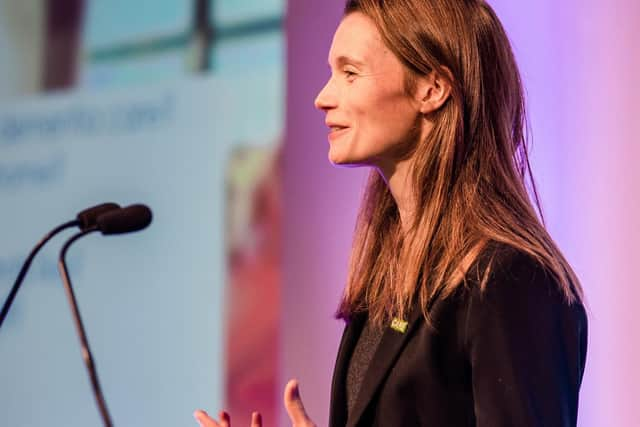How personalised music could support dementia care in BAME communities


Campaigners calling for a more culturally inclusive approach to dementia care have a simple message; there is no one size that fits all.
“We want to make sure everyone living with dementia – no matter what their background is – has access to the care that is right for them and takes the whole person into account,” says Grace Meadows, programme director of nationwide campaign Music for Dementia.
Advertisement
Hide AdAdvertisement
Hide AdThe campaign aims to make music more readily available for people with dementia and is highlighting the need for a personalised approach that caters for cultural differences.


“Having access to personalised music, in the right way and at the right time, has been shown to be more impactful and meaningful in helping to counter the symptoms of dementia, such as anxiety and agitation,” Grace explains. “In addition, it facilitates communication, creativity and importantly enables you to see the person for who they are, through the music that matters to them.”
Dementia worker Ripaljeet Kaur, of the Touchstone BME Dementia service based in Leeds, has been trialling music sessions for people living with dementia in Black, Asian and Minority Ethnic (BAME) communities – and their carers – initially holding them as part of South Asian dementia café Hamari Yaadain.
“It’s important that music is culturally sensitive,” Ripaljeet says. “We try a lot of different music in the music therapy sessions and ask those attending what music they actually enjoy and want to listen to.”
Advertisement
Hide AdAdvertisement
Hide AdRipaljeet, who has been running the cafe virtually during the coronavirus pandemic and took one of the music sessions online for the first time last month, says she has seen a “spark” and boost in mood among people with dementia and their carers when they’ve been given the opportunity to engage with music.
“There’s one person who is in the mid to late stages of dementia and has lost her communication skills and during one session, she started singing her own song. I found out afterwards that it was something she would sing when she was young, I think a family prayer or family song. Everyone joined in with clapping and she just sang her heart out. That moment really hit me.”
After taking part in several of Ripaljeet’s sessions, Pushpa Kapugama, whose husband 81-year-old Dr Somapala Kapugama has dementia, began introducing more music into the home environment, focusing on tunes from Sri Lanka, where the couple lived before moving to the UK.
“When our children were young, we used to watch Top of the Pops and he loved that music but now English music, he’s not fussed about...Whenever I have chance I put some Sri Lankan music on for him and he enjoys it. You can see his face lighting up. I know something is happening in the brain.”
Advertisement
Hide AdAdvertisement
Hide AdRipaljeet says being aware of people’s cultural, religious and language needs - taking into account that people with dementia who are multilingual may start to find it difficult to communicate in languages outside of their mother tongue – makes it “much easier” to organise meaningful activities that resonate deeper with those who attend.
“If they are in a group where everybody’s English speaking and everything is focused around English culture and history, someone who doesn’t speak the language or have the same cultural background will struggle to relate with things,” she says.
Grace agrees. “With the diversity of communities and cultures we have in the UK, it’s really important to understand how different people use music, be respectful of that and build that in to the way services and dementia care is offered. Not everybody grew up listening to Elvis or (Dame) Vera Lynn or The Beatles... When music is personalised and meaningful, it has its most benefit.”
Mohammed Rauf, the founder and director of Bradford-based community interest company Meri Yaadain, is backing Music for Dementia’s calls for a more culturally inclusive approach.
Advertisement
Hide AdAdvertisement
Hide AdSince 2006, he has been pushing to raise awareness of dementia and its behaviours among BAME communities and the organisation now works with service providers to ensure support is culturally appropriate and accessible.
Mohammed, who has an MBE in recognition of his services to people with dementia and their carers, has been driven by personal experience with his late grandma.
“When my grandmother had dementia, we didn’t know what it was,” he recalls. “As a teenager I remember thinking this is a bit funny that grandmother is coming out with vulgar swear (words) totally out of character.
"Obviously she was frustrated and agitated hence why she was swearing. We didn’t know that. Having now worked in this area quite a while, my role has become to champion awareness (of dementia) ...and access to information.”
Advertisement
Hide AdAdvertisement
Hide AdWhile around 25,000 people of BAME backgrounds are accepted to have dementia in the UK, Mohammed says that number could be vastly underestimated due to the stigma attached to the condition across a number of cultures. In five prominent South Asian languages, there is no word for dementia.
“The stigma around dementia is due to a lack of understanding,” he claims. “Dementia is thought about in a derogatory way by many people in the BAME communities. Some think it is madness, possession by jinns or witchcraft, others think it may be a punishment from God.
"So, the family carers and the person with dementia hide it and do not easily seek help or assessment. This means they miss out on vital support, such as music therapy, until they reach the point of crisis and more intensive support is needed.”
“On the organisational side of things, because people aren’t coming forward for services, there’s an assumption that they’re alright and don’t need specialist provision,” he adds.
Advertisement
Hide AdAdvertisement
Hide AdEven many of those who have a diagnosis are missing out on vital care and their carers on much-needed support, Mohammed says, as existing services are often not always tailored to help people from a range of different cultures.
“There must be more education and training for family carers and staff working in dementia services on how to give culturally acceptable care and support people with dementia,” he says.
When it comes to music, he suggests consideration is given to rhythm and recitation too and to folk, religious, classical and Bollywood music, as well as pop. Grace wants to see more recognition of musical diversity and heritage and is pressing for music offerings to become more personalised to the individuals living with dementia.
Summarising the power of such actions, she explains: “There is no cure for dementia. We don’t yet have a pharmacological answer... In the meantime, what we’re saying is this is about helping people to have the best quality of life they possibly can – and that really can be achieved through music.”
Visit musicfordementia.org.uk